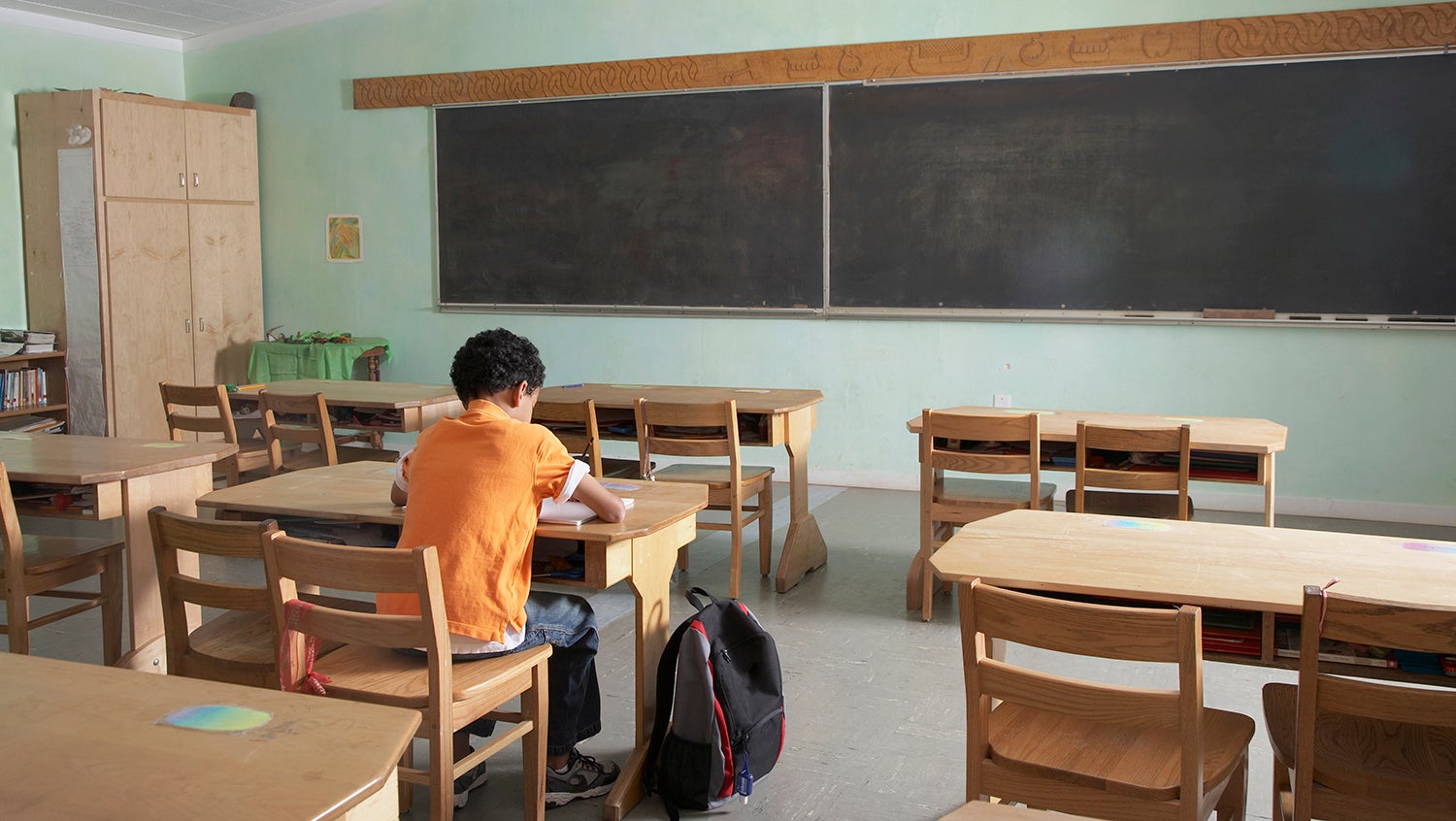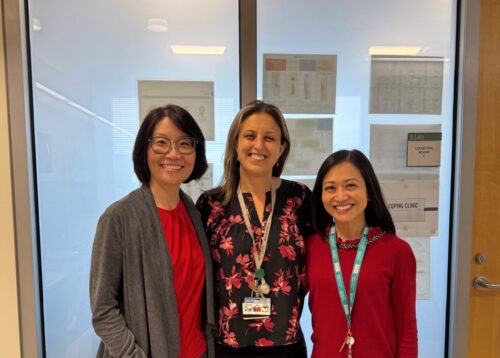Health Providers Address Autism Screening, Support, and Developmental Concerns in Isolation
August 26, 2020
By Meryl Bailey

Getty Images
Schools provide structure pivotal for the success of kids with autism. Health providers are helping to avoid regression through advocacy and direct support.
The complete upheaval of the K–12 education system is among the most distressing and long-term outcomes of the COVID-19 crisis. When the majority of U.S. schools closed with little warning in mid-March, millions of children with learning disabilities were left stranded without the daily in-person support and technologies that help them succeed at learning. The burden abruptly fell on parents to lead their children’s education, maintain or create new routines, and navigate the fragmented and unfamiliar landscape of online learning.
Arguably, the disruption in education has been felt most acutely by children on the autism spectrum and others who thrive on routine and require special services. Trained providers and consistency help scaffold learning and advance skill development while keeping unsafe behaviors at bay. But in the absence of schedules and familiar teachers, paraprofessionals, and therapists, children with autism are especially at risk for skill regression and behavior problems while at home, experts say, including stress-induced behavioral responses from noncompliance and tantrums to aggression, self-injury, property destruction, and running away.
“What we’re seeing, inevitably, is that many of our kids are completely deregulating and struggling without the structure of the school day,” says Shari King, MPH, director of the Autism Program at Boston Medical Center.
Months of unstructured time at home with little to no in-person therapy for children with autism and other learning differences have raised concerns about long-lasting effects, one of the central reasons the American Academy of Pediatrics recently published guidelines advocating children’s physical presence in classrooms next year.
But with much still unknown about how classes will resume, King and other children’s health professionals are trying to bridge gaps for families with children who have or need individualized education programs (IEPs) — legal documents that outline a child’s goals for the school year and the services they require, typically agreed upon at an annual IEP meeting with the child’s caregivers and educators — as they learn from home or go back to school. At a time when some families need them most, however, many schools have suspended IEP intakes.
Health providers bridging support gaps
Some parents are just now recognizing the profound delay in their children’s abilities as they are trying to provide education themselves, says Soukaina Adolphe, MD, a pediatrician with the Engagement and Access to Special Education (EASE) Clinic at Boston Medical Center. Through the EASE clinic, Adolphe helps families advocate for school services. Ordinarily, this assistance meant reviewing IEPs and providing a bridge of communication between families and the special educators in their district. But her role has significantly evolved with the advent of distance learning. During the pandemic, Adolphe has added 50 new families to her patient panel who need extra services but who are not authorized to access them.
“I’ve been able to rush some patients to get some extra testing in case the hospital testing can start a discussion with special needs educators and see if something can be done, like the provision of services through Section 504,” Adolphe explains. Section 504 of the Rehabilitation Act of 1973 protects students from discrimination on the basis of disability. “It may not be a formal IEP, but it helps provide some support for the family.”
Adolphe collaborates with the hospital’s Autism Program, which has ramped up its online resources and support services to help patient families needing IEP-like and other critical support at home during lockdowns. Many children learning at home come from under-resourced families who face language barriers, internet access issues, and myriad financial stressors that make access to online education and resources extremely challenging, if not impossible, says King. In Boston alone, 1 in 5 public school students (or nearly 11,500 children) are enrolled in special education programs, with 30% of these children receiving education in substantially separate classrooms from their general-education peers. In late May, the Boston Globe reported that 20% of Boston Public School students had not accessed online classes, essentially becoming dropouts.
“This is a situation where families with varying language barriers and literacy levels are in the driver’s seat of essentially having to conduct their child’s education. They are receiving all the materials in English, they are looking at websites that are in English,” says King. “So there are huge inequities.”
The providers in the Autism Program and EASE Clinic are doing their part to level the playing field for patients with autism and learning or developmental disorders who face hurdles under ordinary circumstances. The program provides materials in a variety of languages and the team has developed original Zoom programming to guide parents through the special circumstances of caring for children with autism and developmental differences. The program’s social media presence offers both ideas for simple sensory activities and exercise breaks and encouragement and reassurance for exhausted parents who must continually monitor and redirect children from destructive behaviors.
Although specialists worry about the effects of excessive screen time that many parents use to soothe their children while in quarantine, the program’s goal has been to keep children safe at home and away from emergency psychiatric services that could expose them to COVID-19.
“It’s just survival for everybody. It’s survival, and parents need to hear that just surviving is okay. You are doing your best. Whatever your best is, that’s good enough,” King emphasizes.
“It’s survival, and parents need to hear that just surviving is okay. Whatever your best is, that’s good enough.”
It’s the same message that Dr. Adolphe relays to her families. But she serves only 250 patients, and she knows many more families in the area need the same reassurance and advocacy to keep kids’ development from regressing.
Challenges will remain when schools reopen
The complete picture of what the K–12 learning environment will look like this fall remains veiled. Even as COVID-19 case levels fall, Massachusetts school districts face significant challenges in implementing state guidelines that require reduced class sizes, more classroom space, and protective face masks for the majority of students and teachers. Increased layoffs of area teachers further amplify the difficulties of ramping up a full return to the classroom. As a microcosm for issues across the state and nationally, the situation in Boston provides a dire warning to school systems in states now experiencing soaring COVID-19 cases. In this maelstrom of changes, special education has its own unique challenges.
With IEP intakes suspended over the spring school semester, an overwhelming backlog of meetings need to be worked through, hours of intervention need to be accounted for, and a brand-new cohort of young children need to transition from early intervention into special education, say King and Adolphe. With all these challenges comes the increased need for further collaboration between pediatricians, specialists, and special educators to address the skill deficits that children with autism and other developmental delays could be facing.
“Almost every clinical setting that takes care of children needs a version of the Engagement and Access to Special Education clinic,” says Adolphe. “We definitely need to work with public schools and other online communities, acknowledging their limited resources and restraints while continuing to push the envelope, saying, ‘I understand you have this restraint, but how are you going to work on overcoming that?’”
Interested in building an autism friendly healthcare practice? Join the first annual Autism Friendly conference, “Building an Autism Friendly Practice,” on September 11. This conference is designed for healthcare professionals from any discipline or practice setting who want to create or strengthen their organization’s ability to serve patients with autism spectrum disorder (ASD). Click here to register or for more information.


